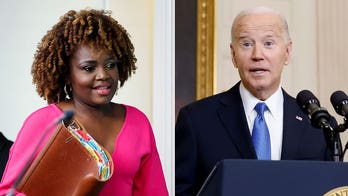Democrats are fanning fears of a government shutdown on the belief that they would benefit politically, but they could be making a dangerous assumption.
The model for the current budget impasse is the 1995 stalemate between a Republican-controlled Congress and Democratic President Bill Clinton. A wily Clinton politically outmaneuvered then-Speaker Newt Gingrich to turn the 20-day shutdown into a bruising PR defeat for the year-old Republican majority.
While Clinton had to eventually sacrifice on substance and put forward a budget that reflected much of what Gingrich and the Republicans wanted, he had set the narrative for his reelection campaign the next year: Clinton the moderate versus the radical Republicans in Congress.
That media narrative, combined with independent Ross Perot siphoning away mostly Republican votes in swing states, helped Clinton capture an 8-point victory in November of 1996.
As Democrats today talk about the looming March 4 deadline to extend government funding, they have grown rather nostalgic for the mid 1990s.
“I think anyone who was here in 1995 knows the disastrous result that occurs when you throw down the gauntlet and say it has to be this way," Sen. Chuck Schumer, D-N.Y., told the Wall Street Journal.
Schumer said he thought Boehner was a “smart guy” who wanted to avoid the consequences of a shutdown but wondered whether Boehner could control freshman members who lack the memory of the Clinton-Gingrich shutdown.
That seems to be what Schumer and his Democratic colleagues are betting on.
House Republicans last weekend passed a bill to fund the government for the seven months of the fiscal year from the start of March to the end of September with cuts of $61 billion from current spending levels.
The response from Senate Majority Leader Harry Reid on Tuesday was a proposal to continue spending for one month at current levels while negotiations continue. But under the Reid plan, there would be only six months left in the year for cuts and the $61 billion proposed by Republicans would automatically shrink to $52.3 billion.
Every week that current spending rates continue means another $2.2 billion less that would be cut under the Republicans’ plan. A long debate benefits Democrats who argue that keeping spending at current stimulus levels is necessary to prevent an economic downturn and the layoff of government workers, who constitute the core of the party’s political base.
House Republicans, even the “smart” Boehner, were incensed by Reid’s answer, which amounted to no cuts now and less time for cuts later.
Meanwhile, President Obama, who said he was waiting for Republicans to be ready for an “adult” conversation about spending, is out in support of his own 2012 budget that calls for new outlays for Democratic pet projects and would add $1.1 trillion to the national debt next year.
With Reid blowing off the Republican spending plan, the president offering no cuts to current spending or future entitlement growth and the administration talking publicly about advance preparations for a government shutdown, Democrats seem to be daring Boehner and the House Republicans to dig in and force a shutdown.
This Democratic brinksmanship, though, may be based on the false assumption that a shutdown now would play out the way it did in 1995.
There are some major differences.
In 1995, Republicans controlled the House and the Senate, as opposed to the divided Congress of today. The GOP has only a third of the decision-making power in this scenario, making it much harder to pin the blame on them.
The personalities are different, too. Just as Obama lacks the political skills of Bill Clinton when it comes to making his case to the electorate, Boehner is a more sympathetic figure than Gingrich. Gingrich famously took a pounding for telling reporters that his decision to take the battle to the brink was partly due to Clinton forcing the speaker to ride in the back of Air Force One. Low-key Boehner would make a less-effective foil for Democrats.
There’s also the media environment. In many ways, 1995 was the last year of the old media world. It was the year before the launch of FOX News and the year before the Internet exploded into American life. The three broadcast television networks and the major newspapers still had a stranglehold on political news in 1995. Shaping the public narrative would be much harder for Democrats in today’s more diffuse and more balanced media world.
Then there’s the public’s attitude on government spending. Polls consistently show that government spending and deficits are the top concerns for about a quarter of voters. Only the economy is of concern to a great share of the electorate.
In 1995, debt and spending were bottom-tier issues in most polls. That makes some sense. In 1995, the federal government was $4.97 trillion in debt. Today, it’s more than $14 trillion in the hole, a sum equal to the size of our entire economy. It is hard to imagine that protesters would not flock to Washington in support of a shutdown if Obama and Reid tried to brush back Boehner on cuts.
A divided Congress, a mild-mannered Republican speaker, a competitive media environment and growing public concern over debt all add up to a tougher environment for Democrats to profit politically from a shutdown.
Mark Twain told us that "History does not repeat itself, but it does rhyme." If Democrats rely too heavily on the 1995 model for the current budget battle, they may find themselves out of tune.
Chris Stirewalt is FOX News’ digital politics editor. His political note, Power Play, is available every weekday morning at FOXNEWS.COM.




